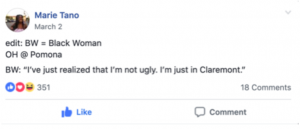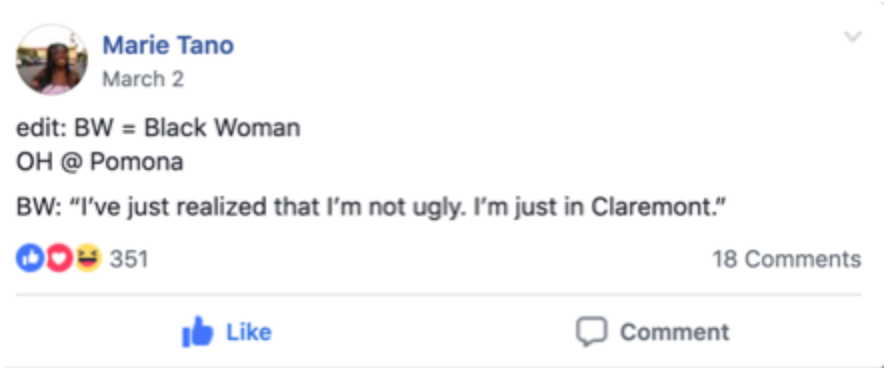By: Priya Canzius ’20
Copy Editor
You lock eyes at the Hoch. He’s in line for a Wet Burrito and you’re adding a warm breadstick to the side of your plate. He smiles. You smile back. It could be love, you think. If he’s into black girls.
“In many cases, black girls receive messages that they are not attractive, that they have many undesirable qualities, and so on,” Sheila Walker, Scripps Psychology Professor and recent author of the book “African American Girls and the Construction of Identity,” said. “These stereotypes operate both in the larger society and, to a certain extent, within the black community. When adolescent girls and young women are told constantly, through media representations, even sometimes within their own families, that they are too dark-skinned, that their hair isn’t “good,” that they are too heavy, too bossy, and so on, they can internalize these negative messages, suffering lowered self-esteem and self-doubt.”
As with most things in life, dating is more difficult for black women (especially non-binary and trans women). According to an OKCupid study conducted in 2014, black women have consistently been regarded as the least desirable potential partners since the app released these dating preference statistics in 2009.
Unfortunately, this trend on OKCupid seems to be fairly reflective of the dating trends at the Claremont Colleges. In a short message on the Scripps College Current Students page on Facebook, I asked for anecdotes about black women’s dating experiences on campus. I received answers that addressed the issues of colorism, exotification, and the role that body type may play in being perceived as a desirable — or undesirable — dating candidate at the Colleges.
Blackness and Difference: “I could never take you home to my parents.”
“I think I haven’t experienced dating as much at the 5Cs because there seems to be a general aversion to dating black womxn,” Ariel Lewis ’20 said.
This aversion is not college-specific, but these feelings can be especially salient at primarily white institutions like the 5Cs. It is no secret that students of certain racial backgrounds are perceived as more desirable and therefore hold more social capital than others.
“It’s this moment where students are coming to college and exposed to more diversity and start to question how that reflects on their hometown, what it would be like to bring someone [from a different background] home, how uncomfortable those conversations might be with family members, [etc.], even though recently more communities are becoming more diverse,” Professor Alyssa Newman, Harvey Mudd’s Hixon-Riggs Early Career Fellow in Science and Technology Studies said. “Black women in college are potentially encountering having to question their desirability because first of all they are representing that diversity that people are encountering for the first time and that diversity is sort of in conflict with the community that people at the Colleges might come from.”
While our student body is composed of a diverse population of students, the individuals within this population often hail from decidedly less diverse communities. Moreover, these less diverse communities may subsequently be even less accepting of diversity than the communities within and nearby the Claremont Colleges.
“One relationship I had during my first year at Scripps was with someone who wasn’t black (and also went to a nearby school outside of the consortium),” Lewis said. “And my race ended up being hindrance in our progress (because as much as he talked about me to his mom, he didn’t tell her I was black). Which sucked! It was also just a reminder that no matter how good people seem to be, or how “woke” they are, they still carry that internalized shame of being associated with someone who’s black.”
I’ve had three separate men — people who I haven’t been interested in dating — explain to me that their family would not approve if we dated because of my race. Each time, they have tried to justify their reasoning. Each time, I have nodded uncomfortably. Each and every time this happened is seared into my memory for years later.
According to Walker, having few dating experiences or negative romantic experiences like Lewis’ or mine may be attributed to the size and racial makeup of the Claremont Colleges.
“The difficulties that many black women face with respect to dating at the 5Cs might not occur on other campuses,” Walker said. “For example, at HBCUs, it is not likely that so many black women would not have a dating life. At larger institutions, where there are larger student populations and more racial and ethnic diversity, dating might not be as much of a problem.”
Exotifying & Fetishizing Blackness: “I bet you taste like chocolate.”
The problem is not simply that Black women are seen as less desirable than other women at the 5Cs. When Black women are perceived as suitable romantic partners at the Claremont Colleges, this perception may stem from the exoticization or fetishization of the women’s Blackness.
“One of the consequences of being fetishized is that even if you are being perceived as attractive, it’s for the wrong reasons,” Newman said. “And I think that black women daters here [at the Colleges] might be interested in being considered as a partners for dating and relationships on the same parameters as anyone else.”
These stereotypes are harmful for many different reasons, but according to Walker, “This kind of attention can make women feel objectified, that they have no worth apart from the appearance of their bodies.”
This is particularly true when one’s body differs from the “ideal” of a community. In Southern California, the “ideal” body type is thinner than it might be elsewhere.
“It’s hard to want to pursue a relationship when you have to think about your body not being good enough, on top of being black, which just makes it seem almost impossible because it’s like double the amount of being ignored,” Lewis said.
Conversely, I’ve had comments made about my lips, my curves, and my ass not living up to “black girl expectation.” In this situation, it’s not about being ignored; it’s about being scrutinized.
Fetishism stems from the expectation that a romantic prospect will live up to a certain stereotype that one has generalized about a group of people. Black women are subject to exotification — and subsequent disapproval if they do not present in the way that the fetishizer expects them to.
Shades of Discrimination: “You’re so pretty for a black girl.”
Due to colorism, within and outside the black community, black women with lighter complexions are typically viewed as “more desirable” dating partners.
“Lamentably, colorism is alive and well in American society,” Walker said. “This is the perspective that the most attractive women are light-skinned, with straight or curly or wavy hair, usually long hair, and with more slender body builds. Needless to say, if one does not fit this model, there is a greater probability of feeling unattractive, undesirable, worthless, lacking in self-confidence.”
While black multi-racial or lighter-skinned black women are often victim to fewer negative racial stereotypes than their darker-skinned counterparts, they too are exotified by potential romantic partners.
“Certainly with lighter-skinned multiracial or lighter-skinned black women, [one can see] the ways in which their blackness is exotified, but their lighter skin is maybe [considered] more palatable or acceptable as something to be,” Newman said
Even so, many black women perceive themselves to be less desirable to potential romantic partners at the 5Cs, including black men. In the aforementioned Facebook post, a Scripps student posted a particularly poignant comment: “Black men hate us too.” Black men are certainly fetishized by women at the Claremont Colleges and beyond, but, in general, there appears to be less of a societal romantic aversion to dating black men.
“The experiences cis-het black men have is far different in that they are generally more accepted in the relationship aspect,” Lewis said. “And black womxn on these campuses don’t have that since we are usually outright fetishized and/or just generally ignored. Even within spaces with other black people, it’s a little bit like black women — especially if you don’t have a lighter complexion — aren’t even valued by other community members.”
This unequal desirability between black men and women at the Claremont Colleges — and elsewhere — gives men a certain social power that women lack.
“One sort of impact of this might just be a relationship between who actually dates outside of their community, but also how this might be a reflection of black male privilege, in a sense,” Newman said. “[Men] can be against and judge black women for their decision to date outside or their race, but they also do that at higher rates than black women do.”
Blackness & Desirability: “I’m just in Claremont.”
Dating is difficult for any college student, but is particularly difficult for black women at the Claremont Colleges. This can perhaps be best exemplified by an Overheard (OH), posted on Meme Queens of the 5Cs by Marie Tano PO ’21 on March 2, 2019.

While the overheard speaker was not necessarily speaking about dating, she was certainly addressing her perceived desirability on these campuses. Now, some people liked this photo, some reacted to it, and some certainly ignored it. But I wonder how many of us understood it for what it really meant.
To the black women on campus who are trying (and maybe failing) to date either within your race or outside of it, please know that it is not your duty to make yourself more “palatable” to potential partners. Know that you are worthy of a love that does not make you feel the need to reject your Blackness. You are not a token of your race and should not be treated like one. If nothing else, please let this serve as a reminder that you are beautiful… Even in Claremont.



